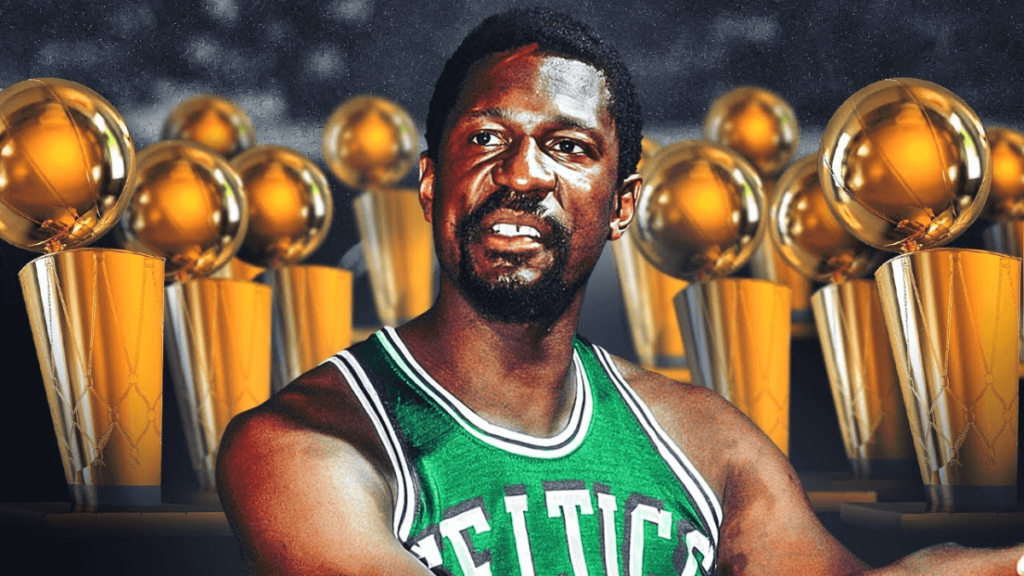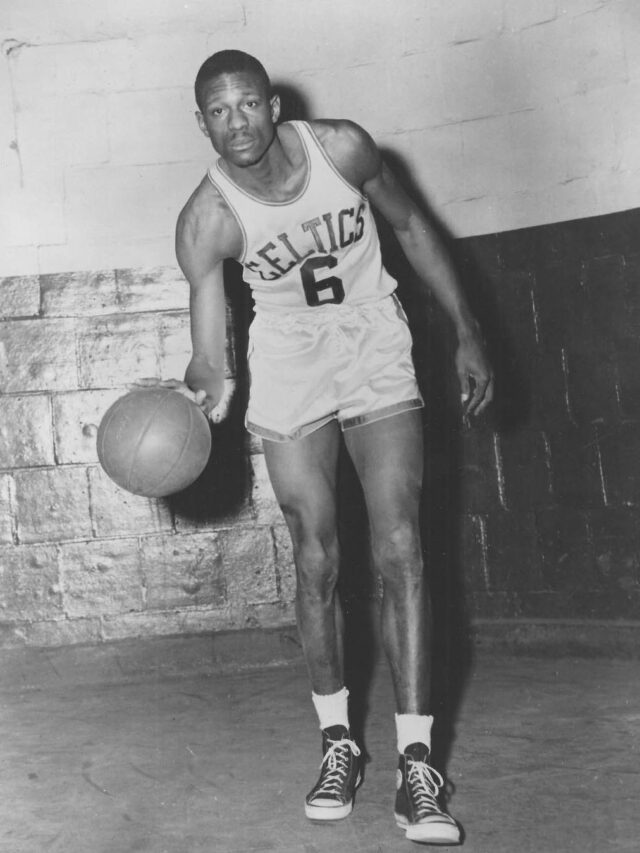The Basketball Legend Bill Russell Has Died At The Age Of 88 After Winning A Record 11 Nba Titles
Bill Russell, one of the best players in the history of basketball, passed away at the age of 88. He posted the announcement on his verified Twitter account, which can be found here.
There has never been a player in the history of the NBA who won more titles than Russell. Among the eleven players, all of them were with the Boston Celtics.
A five-time league MVP, he changed the game by making shot-blocking a key component of a team’s defense as a result of his contributions.
In addition to that, he was a Black athlete who spoke out against racial injustice when it was not as common as it is now and fought against it for years.
The Basketball Legend Bill Russell Has Died At The Age Of 88 After Winning A Record 11 Nba Titles
The lesson a parent taught helps us understand this man and superlative athlete.
As a child, Bill Russell was walking outside his apartment in the projects in Oakland, California one day when he was 9.
A group of five boys ran past him and one of them slapped him on the face. When he and his mother went looking for the group, young Bill expected his mother to punish the members for their actions when they encountered them.
Instead, Katie Russell advised: Fight them one by one, one by one. There were two wins and three losses for him.
According to Russell in a 2013 interview for the Civil Rights History Project, his mother’s message to her teary son changed the trajectory of his life forever.
Russell says, ‘Don’t cry,’ and she says, ‘You did what you were supposed to do,'” he says. “You did what you should have done.
There is no difference between winning and losing when it comes to winning or losing. In the end, what matters is that you stood up for yourself.
That’s what you should always do, and that’s what you must always do.”
I think Russell certainly did on the basketball court – where he blossomed late in his career but went on to revolutionize the sport as a whole.
Elevating the game and taking it with him
“Krebs from the corner. His outside shot was blocked by Russell. And now Russell has made three big plays in the last three minutes of the game. Barnett goes in and Russell blocks it.”
There is no doubt that as early as 1963, Russell was a shot-blocking menace in the NBA Finals game, which marked a sea change in the game.
A good defensive player has never left his feet, as the old adage goes. During the 1950s, his coach at the University of San Francisco believed that this was the case.
However, Russell did not do so. In addition to being a track and field high jumper, it seemed perfectly reasonable to try to elevate his game in basketball as well.
According to a 2013 interview with Russell, he played against a Berkeley team in his first varsity game at USF. Preseason All-American center for their team.
In the first five shots he took, I blocked them. No one had ever seen anything like that in the building. As a result, they called a timeout to discuss what I was doing.
In our huddle, my coach says, “You can’t play defense like that.” He demonstrated how he wanted me to play defense on the sidelines.
As I try it again, the guy scores three consecutive layups. It doesn’t make sense, I said. I returned to playing the way I knew how.
I believe that, in retrospect, what I had been doing was basically bringing a vertical aspect to a game that had previously been horizontal.”
The results of the study were convincing as well.
As a result of Russell’s leadership, San Francisco won two NCAA championships in 1955 and 1956. A gold medal was also won by the United States in the 1956 Olympics under his leadership.
After that, an NBA run that would go down in history began.
Boston’s love and hate
As a team, the Celtics won 11 titles between 1957 and 1969, including eight consecutive titles. There were great players like Bob Cousy, Tom Heinsohn, Sam Jones, K.C. Jones, and many others that contributed to the success of the team.
However, there has never been a Russell like him.
It was he who was the bridge between all 11 championships, a competitor that was so fierce that he would often vomit before a big game.
In spite of his success, there was still a difficult relationship between him and the city in which he played.
It was Russell’s belief that some of Boston’s white fans were untrustworthy as they would cheer when their team won but then complain when the team had too many Black players.
It was reported in a Boston Globe documentary that former teammate Heinsohn recalled how Russell was honored by the Reading suburb of Boston, where he lived, during a dinner held for him.
According to Heinsohn, he was taken aback by this honor that was bestowed on him and broke down in tears.
He went on to say how he wished he could live in Reading for the rest of his life due to the pride that this honor brought him.”
In a short time after Russell’s house was broken into, trophies were destroyed, defecation was found in his bed, and excrement smeared all over the walls of his house.
It became increasingly difficult for him to maintain a warm relationship with those outside the Celtics locker room.
As a result, he developed a reputation for being a surly individual. To weed out the “good” fans, he refused to sign autographs as a way to weed out the “bad” fans.
During his career, Russell had a lot of doubts about the intentions of people,” Stephen Beslic wrote in Basketball Network in 2020, “and he didn’t want to be used for the sake of his popularity.
That’s why he offered a simple solution: you won’t get anything signed by him, but you’ll get 15 minutes of coffee time with one of the best players of all time.”
In Russell’s opinion, if a fan doesn’t want to have a conversation with you, he was still going to sell the autograph even if he doesn’t want to talk to you.
But loving his team
In contrast, Russell had a deep affection for the Celtics, as well as the progressive white people who ran the franchise – owner Walter Brown and the legendary head coach Red Auerbach.
As part of the dynasty era, the Celtics became the first NBA team to have an all-Black starting lineup during the dynasty period.
In 1966, there was more history to be made.
In the wake of Auerbach’s retirement, Russell was named to take his place as the first Black head coach in the history of the NBA.
In spite of the fact that it was historic, Russell said he did not care about it. As far as he was concerned, he simply believed he was the best candidate for the job.
There was a reporter who questioned that, as recounted in the 2013 NBA-TV documentary, Mr. Russell’s House, which recounts the story.
There was a reporter who asked, “As the first black coach in a major league sport, can you conduct your job impartially, without racial prejudice in reverse?”
According to Russell, “Yes, of course,” because respect is the most important factor. In basketball, respect a man for what he is capable of.
Beyond the court
Russell was fully involved in the civil rights movement in the 1960s during the Celtics dynasty, which coincided with the civil rights movement.
He was seated in the front row, at the Lincoln Memorial in Washington, D.C., during Martin Luther King Jr.’s historic “I Have A Dream” speech.
He – along with Black teammates – boycotted a game in Kentucky when a restaurant refused to serve them.
When Muhammad Ali refused to serve in the military during the Vietnam War, he, along with other prominent Black athletes, stood up in support of him.
And Russell wrote a book, Go Up For Glory.
There was a real change in how athletes wrote about themselves and society as a result of the exhibition, according to Damian Thomas, curator at the Smithsonian Museum of African American History and Culture, in charge of the sports exhibition.
In his words, the book that was part of the exhibit was a transformational autobiography that had a profound effect on him.
Rather than just merely focusing on sports, Thomas continued, “we began to see athletes offering opinions about race, opinions about politics, and things of that nature, rather than just sticking to sports.”
A 2020 essay in Slam magazine says that, for Russell, speaking out for civil rights and fighting against racism never ended. He describes George Floyd, who was killed by Minneapolis police that year, as “yet another life stolen by a country broken by prejudice and bigotry.”.
“But what can we do about it?” Russell wrote. “Racial tensions cannot just be shaken out of society because, like dust from a rug, they dissipate into the air and then settle back into place, growing thicker over time.
It is important to note that police reform is only the beginning. We need to dismantle broken systems and start over.
We need to make our voices heard, through multiple organizations, using a variety of different tactics, and we need to call for a new rug for America.”
A laugh for the ages
Throughout Russell’s life, there were times when his life was profound, and other times when it was messy.
During his career, Russell had a falling out with longtime friend and fierce competitor Wilt Chamberlain, whom he had been close to for many years.
Russell disliked the term rival when describing their on-court relationship. In the course of their lives, they were reconciled.
In addition, Russell was able to reconcile, to a certain degree, his feelings about the city of Boston, as well.
There was one constant that remained constant for Russell throughout all of this: his laughter.
This is a laugh that will last a lifetime. I think that the image of Bill Russell in his #6 Celtics jersey, rising above the court to grab a rebound or swat an opponent’s shot, is one of the most recognizable aspects of Bill Russell.
According to Red Auerbach, one of the only things that could make him stop coaching was Bill Russell’s laugh, which was one of the only things that could compel him to stop.
There were, however, many more people who loved his cackle because of its high pitch. It was another lesson taught by Katie Russell that bore the mark of another lesson taught by her.
The advice he received from his mother was to never hold back. Any topic you wish to discuss
Her son was once again able to listen well to what she had to say.


